Region 7 Community Information Guide
EPA Region 7’s Community Information Guide provides communities, nonprofits, stakeholder groups, community-based organizations, academia, tribes, state and local governments, and other partners with the latest news and information on funding and technical assistance opportunities, meetings, conferences, events, webinars, and other activities related to human health and the environment.
This guide is updated frequently, so be sure to check back for the latest information!
On this page:
- Headlines
- Enforcement
- Funding and Technical Assistance
- Meetings, Conferences and Events
- Webinars and Conference Calls

To suggest content for this page, please email: [email protected].
Region 7's "Granting Green: Growing a Greener Tomorrow"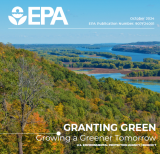
Success stories and achievements of various projects funded by EPA grants are highlighted in EPA Region 7’s publication, "Granting Green: Growing a Greener Tomorrow" (pdf) (2.78 MB) . Region 7 includes Iowa, Kansas, Missouri, Nebraska, and nine tribal nations. The publication's goal is to inspire and encourage ongoing and future efforts in environmental protection and community development, while demonstrating the impact of EPA funding on improving air and water quality, addressing brownfield sites, and promoting environmental justice. |

Headlines
- Date: July 24, 2024
- The Biden-Harris administration released a suite of announcements that further the President’s historic commitment to environmental justice (EJ), as part of the first-ever White House Summit on Environmental Justice in Action. View a recording of the summit. The Department of Transportation participated in the event, along with other cabinet-level agencies.
Biden-Harris Administration Releases Phase Two of Environmental Justice Scorecard
- Date: July 24, 2024
- The Biden-Harris administration announced the second phase of its Environmental Justice Scorecard. This scorecard was created at the direction of President Biden to assess the federal government’s progress on advancing environmental justice (EJ), to provide transparency for the public, and to increase accountability for federal agencies.
- The EJ Scorecard for EPA is a snapshot that provides transparency and accountability as the Agency continues to advance equity and justice, over time, as a central focus for EPA’s mission. The scorecard is not comprehensive of all of EPA’s efforts. Rather, it provides an introduction to the Agency’s ongoing work and commitment to advance equity and justice. Learn more about EPA’s role in the EJ Scorecard.
- Phase One of the Environmental Justice Scorecard, released in Spring 2023, serves as a baseline assessment of Agency actions to advance environmental justice. Phase Two and future versions of the EJ Scorecard will build upon Phase One.
- Background: In fall 2023, the Council on Environmental Quality published a Request for Information in the Federal Register (88 FR 80697) to solicit feedback on Phase One of the EJ Scorecard. The information produced from this solicitation was used to develop Phase Two and will continue to inform future versions. Recommendations from the White House Environmental Justice Advisory Council also informed the development of Phase Two.

Biden-Harris Administration Releases Environmental Justice Science, Data, and Research Plan
- Date: July 24, 2024
- The Biden-Harris administration released a first-of-its kind, government-wide Environmental Justice Science, Data, and Research Plan, which was created to support federal agencies in the advancement of environmental justice (EJ). It features high-level recommendations for identifying and addressing longstanding gaps, barriers, and missing science, data, and research relevant to EJ.
- The four key recommendations include:
- Enhancing meaningful involvement and engagement of the public.
- Fortifying just treatment, equitable access, and protection from environmental injustice.
- Strengthening work and partnership with non-federal entities.
- Institutionalizing environmental justice.
- Background: The EJ Science, Data, and Research Plan is expected to be updated biennially by the EJ Subcommittee of the National Science and Technology Council. Future topic areas may include cross-agency coordination and communication; modeling; participatory science (including community and citizen science); Indigenous Knowledge; and environmental health in areas of air, water, and land pollution. With this plan, the EJ Subcommittee will also inform and support strategies to identify, eliminate, mitigate, and prevent environmental injustice at federal, tribal, state, territorial, and local levels.
- Date: Aug. 22, 2024
- EPA has announced $26 million in funding to protect children from lead in drinking water at schools and childcare facilities. This grant funding will be used by 55 states and territories and the District of Columbia to reduce lead exposure where children learn and play while advancing the goals of the Biden-Harris Administration’s Lead Pipe and Paint Action Plan.
- The funding announced today was authorized by the Water Infrastructure Improvements for the Nation Act and is provided to states, the District of Columbia, and participating territories as grants for lead testing and remediation in schools and childcare facilities. Since 2019, the Voluntary School and Childcare Lead Testing and Reduction Grant has provided over $150 million in funding to conduct testing and removal of lead sources in drinking water in schools and childcare facilities across the U.S.
EPA Releases External Civil Rights Guidance on Procedural Safeguards
- Date: Aug. 22, 2024
- The guidance discusses obligations to:
- Designate a non-discrimination coordinator.
- Publish a notice of nondiscrimination.
- Adopt grievance procedures that assure prompt and fair resolution of complaints alleging federal civil rights violations.
- Collect, maintain, and provide data to EPA upon request to show compliance with civil rights obligations.
- Take reasonable steps to provide meaningful access to persons with limited English proficiency.
- Provide equal opportunity to persons with disabilities.
- Ensure nondiscrimination in public participation processes.
- EPA’s nondiscrimination regulations require, as a condition for receiving EPA financial assistance, that a recipient publish a notice stating that it does not discriminate on the basis of race, color, national origin, disability, sex, and age. Under the regulations, the notice must be posted in a prominent place in a recipient’s offices or facilities. To assist recipients in meeting this requirement, the guidance outlines best practices to meet this condition; for example, posting on a recipient’s homepage and also considering other methods of outreach such as newspapers.
- Date: Sept. 5, 2024
- EPA announced the release of the final Achieving Health and Environmental Protection Through EPA’s Meaningful Engagement Policy. The new policy outlines updates on how the Agency intends to engage with the public and provide meaningful public participation opportunities in all its programs and regions. This policy is grounded in the acknowledgment that EPA's actions to protect public health and the environment are stronger when they are informed by and reflect the lived experiences of the communities and individuals the Agency serves.
- Date: Sept. 18, 2024
- EPA released a new tool called the Kids and Climate Health Zone. This Zone is a collection of stories and information about how the hazards of climate stressors are impacting different childhood life stages and regions in the United States and what people can do to protect their children and families. The tool uses the best available scientific information from the U.S. Global Change Research Program's Fifth National Climate Assessment and other published resources.
Biden-Harris Administration Launches Nationwide Environmental Justice Climate Corps
- Date: Sept. 25, 2024
- In commemoration of Climate Week NYC, EPA and AmeriCorps announced the Environmental Justice Climate Corps, a new partnership launched as part of President Biden’s American Climate Corps to open doors for people to serve in careers that benefit disadvantaged and other low-income communities.
- Date: Oct. 8, 2024
- The Biden-Harris administration issued a final rule requiring drinking water systems across the country to identify and replace lead pipes within 10 years. The Lead and Copper Rule Improvements (LCRI) also require more rigorous testing of drinking water and a lower threshold requiring communities to take action to protect people from lead exposure in water. In addition, the final rule improves communication within communities so that families are better informed about the risk of lead in drinking water, the location of lead pipes, and plans for replacing them. This final rule is part of the president’s commitment to replace every lead pipe in the country within a decade, making sure that all communities can turn on the tap and drink clean water.
EPA Region 7 Paid Volunteers Wanted!
- Date: ongoing (accepted on a rolling basis)
- Are you interested in environmental stewardship but don’t know where to start? Looking for a unique opportunity to work with Midwestern nonprofit organizations to advance environmental justice in underserved communities? Serve as an AmeriCorps VISTA member in the EPA Region 7 Green VISTA Corps Program!
- Three organizations are currently accepting applications for VISTA members. Click each service opportunity listing link below to find the position that’s right for you:
- Disclaimer: These opportunities are national service opportunities, not EPA jobs. Individuals interested in applying would be applying to be an AmeriCorps VISTA member and would work with the nonprofit organization listed in the opportunity.
- Need help applying or want to learn more about the program? Email [email protected] for more information.
Seeking Grant Application Reviewers – Compensation Available!
- Are you interested in Environmental and Climate Justice? Do you want to participate in the process to award transformative climate action and pollution reduction projects and support community-driven projects that can positively transform people’s lives now and in the future? If so, this may be an opportunity for you!
- EPA’s Office of Environmental Justice and External Civil Rights is seeking a diverse group of individuals with relevant expertise and experience to review grant applications submitted under our historic $2 billion Environmental and Climate Justice Community Change Grants Program Notice of Funding Opportunity.
- Compensation will be available for non-federal reviewers!
- Individuals interested in serving as application reviewers should expect to dedicate approximately 10-15 hours per application reviewed. Reviewers may request to serve during one review cycle or multiple ones. Non-federal reviewers will receive compensation through GrantSolutions for the time spent reviewing grant applications. Non-federal reviewers assigned to a review panel will receive up to $200 per application reviewed. It is expected that non-federal reviewers will be assigned no more than 10 applications to review.
- All reviewers will be required to sign a conflict-of-interest statement prior to reviewing applications.
RE-Powering America’s Land Initiative Project Tracking Matrix
- Does your community have climate goals to meet or brownfields that might be suitable for solar? Check out EPA’s Tracking Matrix to learn more about the geothermal, biomass, solar and wind installations across the country. The Tracking Matrix shows current trends in the development of renewable energy on contaminated lands. EPA has identified 502 renewable energy installations with over 2.4 gigawatts of installed electricity capacity on contaminated lands. Approximately 70% are large-scale systems with a project capacity of 1 MW or more. Most continue to be solar development on landfills, which as illustrated below has seen exceptional growth over the past decade. The renewable energy generated by these installations is used to export energy onto the utility grid, offset onsite energy demands, or power cleanup of contaminated sites.
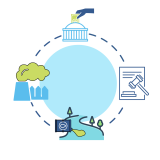
Enforcement
EPA Enforcement Program Seeks Public Ideas for Supplemental Environmental Projects (SEPs)
- EPA has announced a new effort to support the public in sharing their ideas for environmentally beneficial projects that could potentially be included in future enforcement settlements. These voluntary projects, called Supplemental Environmental Projects (SEPs), bring environmental and public health benefits beyond those required by law to communities impacted by a violation of an environmental law or regulation.
- Ideas for SEPs can be submitted to EPA at [email protected]. The following type of information would be useful to EPA and/or a defendant when evaluating a project idea:
- Short Title
- Detailed Description
- Public Health and/or Environmental Benefits
- Information About the Location
- Cost Information
- In addition, the email inbox will allow a person to provide contact information, if so desired, in the event that a defendant or settling party wishes to learn more about a proposed project idea.
- More information about how to submit a SEP idea is available on EPA’s SEP page. Learn more in the related news release.
- Do you want to report an environmental violation? – Click on “Report a Violation” at the top of the page and then select one of the three links.

Funding and Technical Assistance
Climate Resilience and Adaptation Funding Toolbox Launched
- Date: Sept. 11, 2024
- EPA launched a new website, the Climate Resilience and Adaption Funding Toolbox (CRAFT). CRAFT was created to support technical assistance providers working with states, tribes, communities, nongovernmental organizations, academic institutions, businesses, and others looking to invest in climate-resilient projects. By using CRAFT, technical assistance providers can support potential funding applicants and recipients with a variety of simple yet effective resources that include:
- Program overviews of EPA’s financial assistance programs where climate-safe investment opportunities are available.
- Climate risk tools and decision support resources that can inform the development, design, and implementation of projects.
- Communications materials to facilitate discussions about adaptation, resilience, and environmental justice.
- Meaningful engagement resources on how to perform targeted community engagement efforts effectively and intentionally when implementing climate-smart projects.
- Definitions of common terms to use during technical assistance consultations, engagement efforts, and the development of project proposals.
- Technical assistance providers can voluntarily use the materials in CRAFT for both pre- and post-application support. These resources can help reduce the administrative burden on EPA’s funding applicants and recipients as they develop, apply for, and implement their projects with climate change in mind. We hope you find CRAFT useful and would appreciate you sharing this exciting new resource with others in your network!
- Due dates: Dec. 20, 2024, and March 14, 2025
- EPA announced three new funding opportunities, totaling approximately $117 million, to improve recycling infrastructure and consumer education and outreach on wasted food prevention and composting. Two of the notices are for Solid Waste Infrastructure for Recycling (SWIFR) Grants – one funding opportunity for tribes and intertribal consortia (due by March 14) and another for communities across the country (due by Dec. 20) – and are focused on improving solid waste management infrastructure. The third notice is for EPA’s Recycling Education and Outreach (REO) Grant program (due by Dec. 20) and is focused on wasted food prevention and composting. These three funding opportunities, authorized and funded by the Bipartisan Infrastructure Law, will help transform solid waste management infrastructure and improve recycling education and outreach nationwide.
- Pre-recorded informational webinars are available for SWIFR Grants for Tribes and Intertribal Consortia, SWIFR Grants for Communities, and REO Grants. These webinars cover the funding opportunities, key sections of the application, and the application process.
- Due date: Jan. 9, 2025
- EPA announced the latest round of funding from the Clean School Bus Rebate Program with up to $965 million available to school districts. The administration’s Investing in America Agenda continues to accelerate the transition of the nearly 500,000 school buses in America to cleaner technologies, helping to protect the more than 25 million children who ride a school bus every day from harmful air pollution. This fourth round of funding will build on the previous nearly $3 billion in investments being distributed nationwide to further improve air quality in and around schools, reduce greenhouse gas pollution fueling the climate crisis, and help accelerate America’s leadership in developing the clean vehicles of the future.
- EPA also plans to host webinars on the 2024 CSB Rebate Program during the application period. Visit the Clean School Bus Webinars page to register for all upcoming webinars.
U.S. Department of Energy’s Building Codes Formula Funding for States and Territories – $400 Million
- Due date: Sept. 30, 2025 (Full applications)
- This Inflation Reduction Act program provides funding for adopting and implementing building energy codes that reduce utility bills, increase efficiency, lower greenhouse gas emissions that fuel the climate crisis, and make buildings more resilient to climate disasters.
- Eligible entities: states, territories, and units of local government that have the authority to adopt building codes.

U.S. Department of Energy’s Tribal Energy Financing – $20 Billion
- Due date: Aug. 31, 2028 (last Part I submission)
- Information: This program is supporting tribal investment in a broad range of projects and activities for the development of energy resources, products, and services that utilize commercial technology.
- Eligible entities: federally recognized Indian tribes, including Alaska Native Regional Corporations and Alaska Native Village Corporations.
EPA Emerging Contaminants (EC) in Small or Disadvantaged Communities Grant (SDC) – $2 Billion
- Due date: ongoing
- This noncompetitive program will provide states, territories, and tribes with grants to public water systems in small or disadvantaged communities to address emerging contaminants, including per- and polyfluoroalkyl substances (PFAS).
- Eligible entities: states, territories, tribes.
- Due date: ongoing
- EIR offers financing to support projects that retool, repower, repurpose, or replace energy infrastructure that has ceased operations or that enable operating energy infrastructure to avoid, reduce, utilize, or sequester air pollutants or anthropogenic emissions of greenhouse gases.
- Eligible entities: See program guidance.
U.S. Department of Energy’s Home Energy Rebates – $8.8 Billion
- Due date: ongoing (accepted on a rolling basis)
- This funding supports home energy rebates that will help American households save money on energy bills; upgrade to clean energy equipment and improve energy efficiency; and reduce indoor and outdoor air pollution.
- Eligible entities: state and territory energy offices.
EPA’s Community Change Equitable Resilience Technical Assistance
- Due date: ongoing (accepted on a rolling basis)
- EPA has launched a technical assistance program to help disaster-prone and disadvantaged communities prepare to apply for Community Change Grants. The Community Change Equitable Resilience Program will provide free design and project development assistance, community engagement, and partnership development workshops.
- Climate resilience projects that qualify for technical assistance include a focus on new or expanded green infrastructure, open spaces, and/or retrofits of existing community buildings or streets to address climate change impacts (such as extreme heat and more intense heat islands, wildfire and smoke, floods, storms, or other climate impacts that pose a greater risk to disadvantaged communities).
- Requests for technical assistance are now being accepted on a rolling basis until 50 recipients have been identified. Eligible projects must show the following:
- Intent and eligibility to apply for a grant under the Community Change Grant Notice of Funding Opportunity (NOFO).
- Agreement to host EPA contractors for site visits.
- Project location in a disaster-prone area.
- Site description, ownership status, and environmental and land use information (if available).
- Potential resilience benefits for disadvantaged community.
- Engagement opportunities.
U.S. Department of Agriculture’s Strategic Economic and Community Development Program
- Due dates: vary depending on agency
- This program is for projects that support multi-jurisdictional and multi-sectoral strategic community investment plans. Applicants are encouraged to consider projects that will reduce climate pollution and increase resilience to climate change impacts in rural communities.
- Eligible entities: vary depending on agency
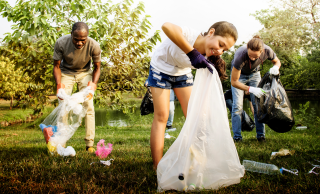
- Due date: TBD
- This funding will install clean energy-generating systems and/or energy efficiency measures for tribal buildings; deploy community-scale, clean energy-generating systems or energy storage on tribal lands; install integrated energy systems for autonomous operation; and power unelectrified tribal buildings. The full Funding Opportunity Announcement (FOA) is expected to be released in spring 2024.
- Eligible entities: tribal governments, intertribal organizations, and tribal energy development organizations.
Coming Soon: U.S. Department of Energy’s Energy Auditor Training (EAT) Program – $40 Million
- Due date: TBD
- This program intends to provide grants to support the training of energy auditors by paying the costs associated with energy auditor trainings and certifications for the purpose of conducting energy audits, or surveys, of commercial and residential buildings.
- Eligible entities: state governments.
- Due date: TBD
- This funding intends to support the development of planning and strategies for utilizing organic waste as a feedstock for various transportation fuel end products. Under this Funding Opportunity Announcement (FOA), Topic Area 1 will support feasibility studies. For communities that may have already identified potential solutions for their waste/transportation needs, Topic Area 2 would support more detailed, engineering design work to position these entities for future projects and demonstrations.
- Eligible entities: state, local, and tribal governments and nonprofit organizations.
- Due date: TBD
- This funding is expected to support communities’ development of in-depth feasibility analyses of potential waste-to-fuels solutions and support communities with completed feasibility studies to advance detailed engineering designs.
- Eligible entities: state, local, and tribal governments, nonprofit organizations, and transit authorities.
- Due date: TBD
- This program will work with communities to co-develop equitable climate resilience plans that are ready for funding and implementation. The priority will be to assist communities that are at the highest risk of climate impacts and have the most need for assistance.
- Eligible entities: partnerships across four domains – government, academic, commercial, and nonprofit organizations.
- Due date: N/A
- This funding opportunity is designed to help tribes build capacity when engaging in the environmental review and permitting process for infrastructure projects covered by the FAST-41 program, which was established by Title 41 of the Fixing America’s Surface Transportation Act. Tribes can secure funding for several resources that may be needed to engage in the permitting process including, but not limited to, additional staff for Tribal Historic Preservation Offices or natural resource offices, upgrading office equipment, training, consultants, reimbursement for travel, and more.
- Eligible entities: federally recognized tribes.
- Due date: N/A
- The Critical Material Innovation, Efficiency, and Alternatives Program is designed to conduct a program of research, development, demonstration, and commercialization to develop alternatives to critical materials, promote their efficient production and use, and ensure a long-term secure and sustainable supply of them.
- Eligible entities: institutions of higher education, for-profit and nonprofit entities, and state and local governmental entities and tribes.

EPA Science Matters: Wildfire Smoke and More
- Smoke from wildfires can impact air quality across much of the U.S. EPA researchers have been working to address many of the issues wildfires present to health and the environment, including preparing communities and individuals on how to protect themselves.
- Listen to EPA's Jason Sacks and a panel of other experts discuss how wildfire smoke affects your health on NPR's 1A.
- EPA's Ana Rappold spoke to The Atlantic about the effects of wildfire smoke and particulate matter on brain function.
- EPA develops software models and tools to address a range of environmental issues. The Community Multiscale Air Quality (CMAQ) modeling system is EPA’s premier tool for studying air pollution from global to local scales. In June 2023, EPA proudly celebrated the 25th anniversary of CMAQ’s initial release with a three-part story on the history and significance of this powerful computational tool.
- Read about what has made the CMAQ model so successful over the years and why it is still relevant today.
- Read about how CMAQ has been working toward a “one environment-one health” approach throughout its lifetime.
- Read about how CMAQ has continued to innovate, modernize, and address emerging environmental issues.
Combined Sewer Overflows
- Combined Sewer Overflow (CSO) Technical Assistance is available from EPA’s Office of Wastewater Management on monitoring/modeling; smart sewers and smart data; asset management; operation and maintenance; regulatory/ compliance questions; and small CSO community spreadsheet-based tools (CSO model, long-term control plan review checklist, post-construction compliance monitoring checklist). See flyer for more information.
Environmental Finance Center Network
- The Environmental Finance Center Network offers free help on training and technical assistance to small wastewater and decentralized wastewater treatment works serving approximately 10,000 or fewer people. Request assistance here.
EPA Cybersecurity Assessments and Technical Assistance
- Interested water and wastewater utilities can sign up for FREE, confidential cybersecurity assessments and technical assistance services provided virtually.
- Register here
U.S. Department of Energy’s National Community Solar Partnership (NCSP) States Collaborative
U.S. Department of Energy’s Clean Cities Coalition Network Technical Assistance
- To assist with alternative fuels, fuel economy improvements, and emerging transportation technologies.
EPA’s Technical Assistance to Brownfields Communities Program
White House Bipartisan Infrastructure Law Guidebook
- A roadmap to the funding available under the law and program-by-program information is now available, including the downloadable guidebook data and EPA’s Bipartisan Infrastructure Law page.
- This update includes data provided by EPA Brownfields, Superfund, Abandoned Mine Lands, Landfill Methane Outreach, and Resource Conservation and Recovery Act programs, and a pilot with Underground Storage Tanks, in addition to data from 22 state partners. Over 190,000 sites and nearly 40 million acres of land are included and screened for solar, wind, biomass and geothermal energy potential. EPA partnered with the U.S. Department of Energy’s National Renewable Energy Lab (NREL) to provide up-to-date data and screening that reflects current trends in renewable energy development.
EPA's Legal Tools to Advance Environmental Justice (EJ Legal Tools)
- EPA’s Office of General Counsel offers EPA Legal Tools to Advance Environmental Justice (EJ Legal Tools), an updated and expanded compilation of legal authorities available to EPA for identifying and addressing the disproportionate impact of pollution on underserved and overburdened communities, including communities of color, Indigenous people, and low-income communities. EJ Legal Tools is intended to help EPA decision-makers and partners understand their authorities to consider and address environmental justice and equity in decision-making, and to promote meaningful engagement.
EPA Combined Sewer Overflow (CSO) Tools Available
- Check out the NEW CSO Tools for combined sewer overflow permittees and permitting authorities for planning and management of different aspects of CSO programs. Each tool consists of an interactive spreadsheet, fact sheet or user guide, and three recorded trainings. These tools, which are currently in Beta test version, do not present new or changed requirements; rather they attempt to help break down information in a more digestible and interactive fashion.
- Long-Term Control Plan (LTCP) Review Checklist – Designed to help CSO permittees and NPDES authorities determine if LTCPs meet the requirements of the Clean Water Act (CWA) and the CSO Control Policy, and conform with EPA guidance on developing LTCPs.
- Post-Construction Compliance Monitoring (PCCM) Checklist – Designed to help CSO permittees and NPDES authorities develop and evaluate PCCM programs to meet the requirements of the CWA and CSO Control Policy, and conform with EPA guidance on PCCM.
- Combined Sewer Overflow (CSO) Model for Small Communities – Planning tool for small CSO communities that want a reasonably simple approach to estimating a CSO occurrence, as well as treated or untreated CSO volume over a 24-hour period and have limited resources to invest in more advanced CSO monitoring and modeling.

Meetings, Conferences and Events
No items at this time.Please check back for new meetings, conferences and events |

Webinars and Conference Calls
No items at this time.Please check back for new webinars and conference calls. |
The information above is being provided by EPA Region 7 for informational purposes only. This page contains links to information, agencies, sites, and organizations external to EPA’s website. EPA is not responsible for third-party links. EPA does not endorse third-party organizations or agencies.
Related Information
Environmental Justice
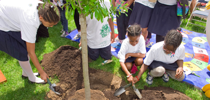
Region 7 EJ Community Stakeholder Quarterly Virtual Meeting – Jan. 16, 2025, from 6:30 to 8 p.m. CST. See more details in the EPA R7 EJ Community Stakeholder Meeting Flyer (pdf) (207.39 KB) .
Past meeting presentations:
- Oct. 17 (pdf) (5.44 MB)
- May 16 (pdf) (3.2 MB)
- Feb. 22 (pdf) (3.41 MB)
Historic EPA Funding
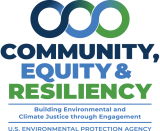
Region 7 hosted outreach events about Community Change Grants and EJ Thriving Communities Grantmakers Subgrants in Wichita, Omaha, and Kansas City, Missouri.
View webinar video and past event presentations:
- Aug. 22 (pdf) (3.84 MB)
- Aug. 8 (pdf) (4.51 MB)
- May 28 (pdf) (3.88 MB)
